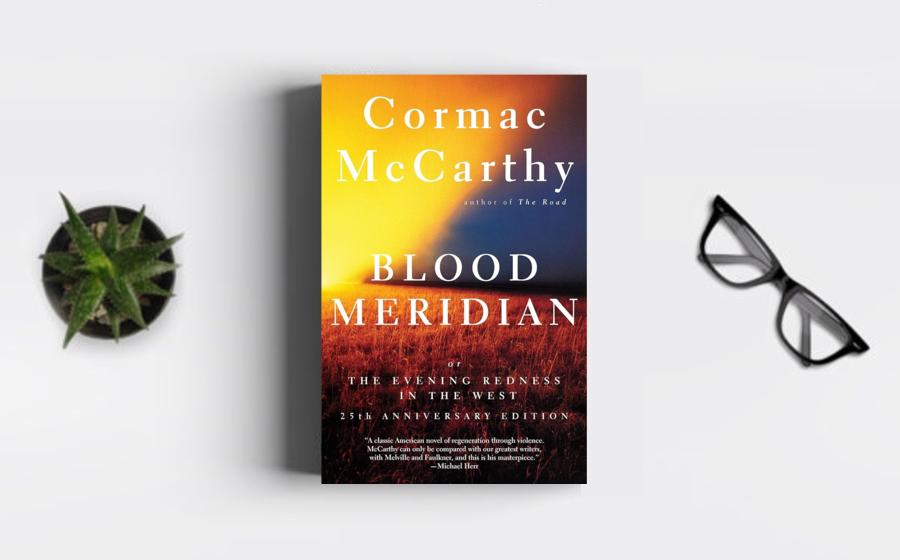"Blood Meridian" by Cormac McCarthy, published in
1985, is a haunting and brutal masterpiece that
transcends traditional narratives of the American West.
Set against the backdrop of the mid-19th century, the
novel follows the journey of an unnamed protagonist
known as "the Kid" as he becomes entangled with a group
of scalp hunters led by the enigmatic and malevolent
Judge Holden. McCarthy's unflinching prose,
philosophical depth, and exploration of the dark
underbelly of human nature have elevated "Blood
Meridian" to the status of one of the top American
classics of all time.
The narrative begins with
the Kid's turbulent childhood and follows his
progression from a wayward adolescent to a hardened
participant in the violent and lawless world of scalp
hunting along the Texas-Mexico border. The Kid's odyssey
unfolds in a relentless landscape marked by atrocities,
clashes with Native American tribes, and the moral
vacuum that defines the merciless pursuit of wealth and
power.
One of the defining strengths of "Blood
Meridian" is McCarthy's evocative and lyrical prose,
which serves as a stark contrast to the brutality
depicted in the novel. McCarthy's language is both
poetic and visceral, creating a narrative atmosphere
that is simultaneously beautiful and horrific. The vivid
descriptions of the landscape, the raw violence, and the
existential reflections elevate the novel beyond a mere
historical tale, establishing it as a work of literary
artistry.
The character of Judge Holden emerges
as a central figure whose enigmatic presence casts a
shadow over the entire narrative. A polymath and
embodiment of malevolence, the Judge serves as a symbol
of the darkness within the human soul. McCarthy's
portrayal of the Judge transcends conventional notions
of villainy, becoming a complex and philosophical
exploration of the nature of evil. The Judge's
relentless pursuit of knowledge, power, and violence
challenges readers to confront the darkest aspects of
human nature and the moral ambiguity that permeates the
novel.
The landscape itself becomes a character
in "Blood Meridian," reflecting both the harsh physical
realities of the American West and the psychological
terrain navigated by the characters. The vast and
unforgiving deserts, mountains, and plains serve as a
metaphor for the moral wilderness inhabited by the
novel's protagonists. The relentless and indifferent
nature of the landscape mirrors the existential
struggles faced by the characters, contributing to the
novel's portrayal of a world devoid of mercy or moral
order.
McCarthy's exploration of the Judge's
philosophy adds a layer of intellectual depth to the
narrative. The Judge's discourses on war, violence, and
the nature of existence resonate with existential
themes, inviting readers to grapple with profound
questions about the human condition. The Judge's
perspective, though disturbing, forces an examination of
the capacity for brutality within individuals and
societies, challenging conventional notions of morality
and ethics.
"Blood Meridian" is recognized for
its thematic complexity and layered symbolism,
contributing to its status as a classic. The novel
addresses the historical realities of the Indian Wars
and the border conflicts between Mexico and the United
States, but it transcends mere historical fiction.
McCarthy weaves a narrative that delves into the
universal and timeless aspects of human existence,
exploring themes of violence, identity, and the search
for meaning in a seemingly indifferent world.
The
novel's enduring impact is evident in its critical
acclaim and influence on subsequent literature. "Blood
Meridian" has been praised by literary scholars,
critics, and fellow authors for its originality and
artistic merit. Its influence can be seen in the works
of contemporary writers who draw inspiration from
McCarthy's distinctive narrative style and thematic
depth. The novel's ability to provoke intense
intellectual and emotional responses contributes to its
enduring reputation as a work of unparalleled literary
significance.
The novel's cinematic quality has
further contributed to its cultural impact. While "Blood
Meridian" has not been adapted into a film, its visual
and atmospheric storytelling has inspired filmmakers and
artists. The novel's vivid imagery and stark landscapes
have resonated with those seeking to capture the harsh
beauty and brutality of the American West on screen.
McCarthy's prose, characterized by its poetic intensity, creates a narrative that lingers in the mind of the reader, inviting contemplation of the darkest aspects of the human experience. "Blood Meridian" remains a testament to the power of literature to challenge, provoke, and illuminate the complexities of the human soul in the vast and brutal landscapes of the American frontier.






